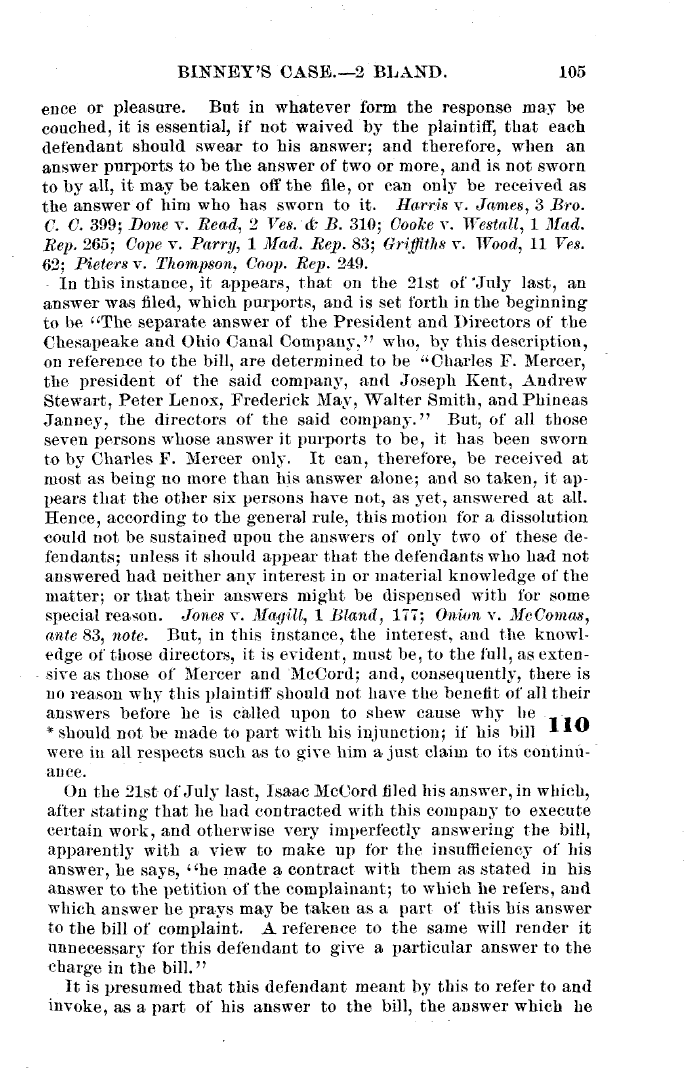|
BINNEY=S CASE.-2 BLAND. 105
ence or pleasure. But in whatever form the response may be
couched, it is essential, if not waived by the plaintiff, that each
defendant should swear to his answer; and therefore, when an
answer purports to be the answer of two or more, and is not sworn
to by all, it may be taken off the file, or can only be received as
the answer of him who has sworn to it. Harris v. James, 3 Bro.
C. C. 399; Done v. Read, 2 Ves. ch B. 310; Cooii:e v. Tl'estalt, 1 Ifad.
Rep. 265; Cope v. Parry, 1 llfad.. Rep. 83; Griffiths v. TFood, 11 Ties.
62; Pieters v. Thompson, Coop. Rep. 249.
In this instance, it appears, that on the 21st of 'July last, an
answer was filed, which purports, and is set forth in the beginning
to be "The. separate answer of the President and Directors of the
Chesapeake and Ohio Canal Company, '1 who, by this description,
on reference to the bill, are determined to be "Charles F. Mercer,
the president of the said company, and Joseph Kent, Andrew
Stewart, Peter Len ox, Frederick May, Walter Smith, and Phineas
Janney, the directors of the said company." But, of all those
seven persons whose answer it purports to be, it has been sworn
to be Charles F. Mercer only. It can, therefore, be received at
most as being no more than his answer alone; and so taken, it ap-
pears that the other six persons have not, as yet, answered at all.
Hence, according to the general rule, this motion for a dissolution
could not: be sustained upon the answers of only two of these de-
fendants; unless it should appear that the defendants who had not
answered had neither any interest in or material knowledge of the
matter; or that their answers might be dispensed with for some
special reason. Jones v. Magill, 1 Bland, 1 7 T; Oizion v. JITeComas,
ante 83, note. But, in this instance, the interest, and the knowl-
edge of those directors, it is evident, must be, to the full, as exten-
sive as those of Mercer and McCord; and, consequently, there is
no reason why this plaintiff' should not have the benefit of all their
answers before he is called upon to spew cause why lie
should not be made to part with his injunction; if' his bill 1
were in all respects such as to give him a just claim to its continu-
ance.
On the 21st of July last, Isaac McCord filed his answer, in which,
after stating that he had contracted with this company to execute
certain work, and otherwise very imperfectly answering the hill,
apparently with a view to make up for the insufficiency of his
answer, he says, "he made a contract. with them as stated in his
answer to the petition of the complainant; to which he refers, and
which answer he prays may be taken as a part of this his answer
to the bill of complaint. A reference to the same will render it
unnecessary for this defendant to give a particular answer to the
charge in the bill."
It is presumed that this defendant meant by this to refer to and
invoke, as a part of his answer to the bill, the answer which he
|

